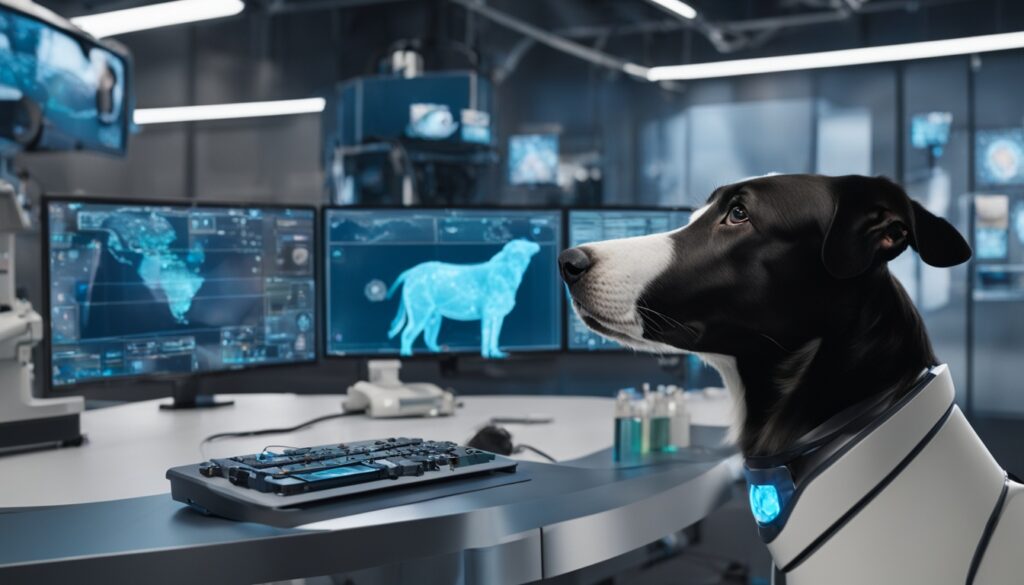Technology is changing fast, and artificial intelligence (AI) is leading this change. It’s changing how we work and what skills we need. Now, new jobs are coming up because of AI, offering great career chances for those who want to lead in this field.
Imagine being part of this AI-driven future, helping shape the technologies that will shape our future. Sounds interesting? Let’s dive into the new careers that are changing the job world. These careers see AI as a key tool for making new things and moving forward.
Key Takeaways
- Discover the cutting-edge professions that are transforming the job market with the rise of AI.
- Learn about the roles and responsibilities of AI-driven careers, from machine learning engineers to conversational AI developers.
- Understand the skill sets and educational pathways needed to thrive in these emerging fields.
- Explore the ethical considerations and the growing need for AI-human interaction designers.
- Uncover the transformative potential of AI and how it is shaping the future of work.
Embracing the AI Revolution
Artificial intelligence (AI) is changing the way we work in big ways. It’s not just a trend; it’s a game-changer. AI is making old jobs obsolete and creating new ones. It’s bringing us into a new era of work.
The Transformative Impact of AI
AI is making tasks easier and faster in many fields. It helps in healthcare, finance, logistics, and manufacturing. AI is doing jobs that humans used to do, making us think differently about work.
Preparing for the Future of Work
We need to get ready for the AI-driven job market. This means learning new skills and being open to change. Jobs like machine learning engineers and AI ethics consultants are becoming key in this new world.
By embracing AI, we can use this technology to create new chances, boost productivity, and move forward in our changing world.

“AI is not just a technology; it’s a fundamental shift in the way we work, think, and interact with the world around us.”
AI Ethics Consultants: Navigating Moral Dilemmas
As AI grows in power, a new job has come to the forefront: AI ethics consultants. They are key in making sure AI is used right, matching up with what we value and think is right.
These experts work with companies and government to spot and fix AI’s ethical problems. They do many things, like:
- Looking into how AI affects privacy, data safety, bias in algorithms, and how clear it is.
- Creating rules and guides for making and using AI right.
- Helping with tough ethical choices and solving moral problems.
- Advising on how to make AI policies and practices responsible.
- Teaching others about the best ways to handle AI ethics.
The need for ethical checks on AI is growing as it changes. AI ethics consultants are crucial. They make sure AI helps everyone, not just a few, and avoid bad outcomes.
“The role of AI ethics consultants is to be the moral compass for organizations, helping them navigate the complex ethical landscape of artificial intelligence.”
AI ethics consultants work with developers and policymakers. They help shape AI’s future in a way that’s good for all of us.

Machine Learning Engineers: Unlocking Data Insights
The AI revolution is changing the world, and machine learning engineers are key to this change. They design and use complex algorithms to help machines learn and find important insights in big data.
Roles and Responsibilities
Machine learning engineers are vital in making AI applications and systems. They do many important tasks, such as:
- Creating and improving machine learning models to solve tough problems
- Gathering, cleaning, and looking at lots of data to train models
- Adding machine learning to software and systems
- Working with teams like data scientists and software engineers to make sure machine learning works well
- Keeping an eye on and making machine learning models better
Skill Requirements
To be a great machine learning engineer, you need both technical skills and problem-solving abilities. You should have:
- Strong Programming Skills: Knowing languages like Python, Java, or C++ is key for making and adding machine learning to software.
- Mathematical and Statistical Knowledge: Understanding things like linear algebra, calculus, probability, and statistics is important for making and improving machine learning models.
- Machine Learning Expertise: Knowing a lot about machine learning methods, like supervised and unsupervised learning, deep learning, and natural language processing, is a must.
- Data Handling Capabilities: Being good at collecting, cleaning, and analyzing data, especially big datasets, is important for machine learning engineers.
- Critical Thinking and Problem-Solving Skills: Being able to break down complex problems, find the best solutions, and fix issues is key to doing well in this job.
As more companies need machine learning engineers, these experts are leading the way in finding new insights and driving innovation in many fields.
| Key Responsibilities | Required Skills |
|---|---|
|
|
“Machine learning engineers are the architects of the AI revolution, designing the systems that power the digital transformation of industries.”
Data Annotators: Fueling AI’s Growth
Data annotators are key to the growth of artificial intelligence (AI). They work behind the scenes, labeling and categorizing data for AI models. Their work is vital for making AI systems accurate and reliable.
Data annotators look at raw data like images, audio, or text. They add labels and tags to it. This makes the data usable for AI algorithms to learn and get better. They help AI systems recognize objects in photos or understand customer feelings in reviews.
The Art of Data Annotation
To be good at data annotation, you need special skills. You need a sharp eye for details, to understand complex info, and know how the AI will be used. You also need to work well with others to make sure your work is accurate and consistent.
Data annotators do more than just label data. They make sure the data is reliable for AI development. Their careful work helps build AI models we can trust.
The Future of Data Annotation
As AI gets better, we’ll need more skilled data annotators. They will be crucial in making AI better and more reliable. Their work will shape the future of AI, making sure it’s based on high-quality data.
Data annotators will lead the AI revolution in the future. They will use their skills to bring new innovations and make AI even more powerful.
| Key Skills for Data Annotators | Responsibilities of Data Annotators |
|---|---|
|
|
“Data annotators are the unsung heroes of the AI revolution, transforming raw information into the reliable foundation that powers the most advanced algorithms.”
The role of data annotators will grow more important as AI evolves. They are the behind-the-scenes heroes, driving AI’s growth and shaping its future.
New professions emerging with artificial intelligence
The AI revolution is changing many industries. It’s bringing new jobs that we couldn’t have imagined before. These jobs use AI technology in new ways to make things better and more responsible.
AI Ethics Consultants are one of these new jobs. They help deal with the tricky moral and ethical issues that come with using AI more in our lives. They work with companies to make sure AI is used right and follows ethical rules.
Machine Learning Engineers are also in demand. They make and improve the algorithms that help AI make smart decisions. These experts blend computer science, data analysis, and specific knowledge to make AI work better.
Data Annotators are key to growing AI systems. They carefully label and sort big datasets. This work helps train and improve AI models for many different uses.
As AI becomes more common, we’ll see even more new jobs that are both innovative and specialized. These jobs will be important for the future of work and society.
“The future of work is being redefined by the rapid advancements in artificial intelligence. These new professions are paving the way for a more intelligent and ethically-driven society.”
Conversational AI Developers: Crafting Intelligent Dialogues
A new type of professional has come to the forefront in the AI world – the conversational AI developers. They make chatbots and virtual assistants that talk like humans. These experts are key to making interactions with technology feel natural.
Conversational Design Principles
Creating engaging chats needs a deep knowledge of how to design conversations. These developers learn to make interfaces that feel like talking to another person. They focus on understanding language, tone, and context to make AI respond well to what users say.
Natural Language Processing Techniques
At the core of making chatbots smart is knowing how to handle language. Developers must be good at understanding and processing human speech. They use advanced algorithms and natural language skills to make conversations feel real and interactive.
| Key Responsibilities of Conversational AI Developers | Essential Skills for Conversational AI Developers |
|---|---|
|
|
The need for smart and engaging chats is growing fast. That’s why conversational AI developers are so important. They mix technical skills with knowledge of how people talk. This makes them key to creating the next wave of AI that can talk like us.
Robotics Technicians: Bridging the Physical and Digital Worlds
The AI-powered robotics revolution is changing industries fast. Skilled robotics technicians are in high demand. They make sure advanced robotic systems work well and safely.
These technicians install, maintain, and fix robotic gear in places like factories and hospitals. They know a lot about both the technical and problem-solving sides of robotics. This helps them manage the complex mix of hardware and software in these machines.
Key Responsibilities of Robotics Technicians
- Performing preventive and reactive maintenance on robotic systems
- Diagnosing and addressing issues, such as mechanical failures or programming errors
- Collaborating with engineers and programmers to optimize the performance of robotic systems
- Ensuring compliance with safety protocols and industry regulations
- Providing training and support to operators and end-users
Necessary Skills for Robotics Technicians
- Proficiency in electrical, mechanical, and control systems
- Familiarity with programming languages and software used in robotics
- Ability to interpret technical schematics and manuals
- Critical thinking and problem-solving skills
- Attention to detail and a commitment to safety
| Skill | Importance Level |
|---|---|
| Electrical and Mechanical Aptitude | High |
| Programming and Software Knowledge | High |
| Troubleshooting and Problem-Solving | Very High |
| Safety Awareness | Extremely High |
As more robotics technicians are needed, they’re key to the future of how digital and physical worlds meet. They make sure robots work well and safely in many industries.
“Robotics technicians are the unsung heroes of the AI revolution, ensuring that the physical and digital worlds coexist in perfect harmony.”
AI-Human Interaction Designers: Enhancing User Experiences
AI is becoming a big part of our lives, making the job of AI-human interaction designers very important. These experts mix knowledge in making user experiences better, understanding complex language, and analyzing AI risks. They aim to make interfaces that smoothly connect humans with AI.
We deeply know how people use technology. We use cognitive psychology, ergonomics, and design thinking to make AI systems better. These systems help users work more efficiently and feel happier. By understanding how people act and talk, we make interfaces that meet user needs and give personalized experiences.
We also focus on making AI safe and ethical. As designers, we work with AI risk analysts to follow ethical rules and protect user privacy. By using complex language analysis and risk checks, we make AI solutions that users can trust and feel in control of.
 Gmrxe Entertainment and Information
Gmrxe Entertainment and Information




